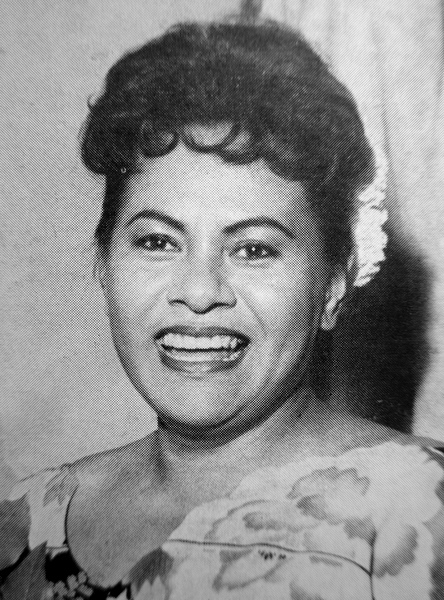Mavis Chloe’s history is as unique as her singing. She is the daughter of Moody Charles Rivers, and Louisa Stehlin. Born in Apia (West Samoa) on 19 May 1929 into a Mormon family with mixed Samoan, French, Swiss and Swiss ancestry. She was one of 13 musically gifted kids and performed in a series family musical nights that made their home an entertainment center. One of her uncles built Western Samoa’s first short-wave radio station. Some of these broadcasts were also broadcast. The Second World War began in the Pacific. Mavis’ family moved to Pago Pago in American Samoa. There, Mavis was a mascot for thousands of American servicemen. She sang her way from camp to camp with the help of her father’s band. A special switchboard telephone hookup allowed soldiers and marines from faraway to hear her singing. In 1947, the Rivers family moved to Auckland. They lived in Grey Lynn, Sandringham, and later in Grey Lynn. Mavis was a stenographer at Farmers’ Trading Company. She auditioned successfully for nightclub work at Queen Street’s Peter Pan cabaret. She began radio work at 1YA and 1YD in 1948. She quickly became a popular singer in New Zealand. In 1949, she recorded her first 78 rpm album with the newly established TANZA (To Assist New Zealand Artists). Rivers brought her three sisters Natalie, Mitzi, and Sally to TANZA. They lent their amazing vocal harmonies for numerous recording sessions. Mavis began her recording career in a basement studio on Auckland’s Shortland Street. She went on to record more than 40 songs with TANZA as a soloist or in duets and as a guest vocalist with many of the most popular bands of that era. Later, she recorded for the Zodiac label. This was another pioneer in the New Zealand music scene. She recorded mostly Polynesian music at first, but she soon proved her versatility and began to do jazz numbers with great skill. Rivers spent the year 1953-1954 in America, where she was on scholarship at Brigham Young University, Provo, Utah. After singing in a variety show at Salt Lake City, her student visa was expired. She then returned to American Samoa, where she worked as a disc jockey on its radio station for six months. In January 1955, she returned to the USA and settled in Los Angeles. She was unable to find work at first and returned to secretarial work for a few more months before landing a spot as a guest singer with a Hawaiian quartet in local clubs. Glicerio Catingub, a Filipino singer/bass player, was part of the group. Mavis got married in Los Angeles on October 4, 1955. The birth of her first son in 1955 saw her briefly retire from singing. After resuming her singing career, she gained steady popularity in Los Angeles and Las Vegas. She signed a major recording deal with Capitol Records in 1958. There she worked alongside Nelson Riddle, a Hollywood arranger, on three albums including Take a number (1959). Frank Sinatra saw her talent and signed her immediately to his new Reprise label. Marty Paich, the arranger for Ella Fitzgerald and Mel Torme, was her co-worker. She recorded numerous albums for major and minor US labels and was a regular on the ‘The Steve Allen Show’ as well as other television programs. Rivers visited New Zealand frequently: she performed on television and radio in New Zealand in 1963-64, with her family. In 1977, she was a star at an Auckland jazz festival. In 1981, she returned with her son Matt Catingub to perform in a variety show for Queen Elizabeth II. Mavis and Matt returned to Auckland Town Hall two years later, where she was moved by the warm reception. She sang in 1990 at the New Zealand International Festival of the Arts, Wellington, and at a Jazz and Blues Festival in Auckland. Rivers performed until her death on May 29, 1992, after a Los Angeles show. Her husband and her two sons were her survivors. Many of her peers referred to Mavis Rivers as one of the greatest female jazz singers in history. She was also a popular figure among jazz purists. Frank Sinatra said she was the ‘purest voice in jazz’ and compared her to Ella Fitzgerald. Although her recordings from New Zealand are not well-known outside of this country, they make up an important part in the history of recorded music. Rivers, despite spending most of her life in America, holds a special place among New Zealanders. They fondly recall her as the country’s greatest jazz singer. bio by teara.govt.nz
